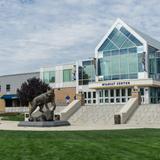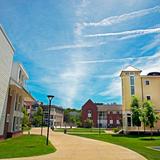- Dean College, a private residential college fostering academic and personal success, offers baccalaureate degrees and associate degree programs through the Schools of Art, Business, Dance and Liberal Arts. Dean provides its students with quality teaching, personalized academic support, and leadership development opportunities that promote a lifetime of learning and achievement. In a society where change is constant and dramatic, Dean College is committed to graduating students who are well-prepared for further collegiate study and demonstrate strong community and social responsibility, high standards of personal integrity, and the ability to thrive in a global environment.
School Highlights
Dean College serves 1,345 students (84% of students are full-time).
The college's student-teacher ratio of 6:1 is lower than the state community college average of 12:1.
Minority enrollment is 43% of the student body (majority Black and Hispanic), which is less than the state average of 57%.
Quick Facts (2025-26)
- Enrollment: 1,345 students
- Private-state tuition: $40,414
- Acceptance Rate: 74%
- Student-teacher ratio: 6:1
- Minority enrollment: 43%
- Source: Verified school update
School Overview
The teacher population of 239 teachers has stayed relatively flat over five years.
Dean College
(MA) Community College Avg.
Carnegie Classification
Baccalaureate Colleges: Diverse Fields
Associate's Colleges: Mixed Transfer/Career & Technical-Mixed Traditional/Nontraditional
Institution Level
Four or more years
At least 2 but less than 4 years
Institution Control
Private not-for-profit
Public
Total Faculty
239 staff
290 staff
School Calendar
Student Body
The student population of Dean College has stayed relatively flat over five years.
The student-teacher ratio of 6:1 has increased from 5:1 over five years.
The Dean College diversity score of 0.64 is less than the state average of 0.74. The school's diversity has stayed relatively flat over five years.
Total Enrollment
1,345 students
2,687 students
Student-Teacher Ratio
6:1
12:1
# Full-Time Students
1,132 students
1,039 students
# Part-Time Students
213 students
1,648 students
# Enrollment Undergraduate
134 students
278 students
# Full-Time Undergraduate Students
1,132 students
839 students
# Full-Time Graduate Students
n/a
217 students
# Part-Time Undergraduate Students
213 students
1,619 students
# Part-Time Graduate Students
n/a
346 students
Total Dormitory Capacity
1,049 students
400 students
% American Indian/Alaskan
n/a
n/a
% Asian
1%
6%
% Hispanic
10%
21%
% Black
11%
15%
% White
57%
43%
% Hawaiian
4%
1%
% Two or more races
4%
3%
% Non Resident races
2%
2%
% Unknown races
10%
9%
Diversity Score
0.64
0.74
College Completion Rate (Students who graduate in less than 4 years)
n/a
21%
College Completion Rate (Students who graduate in 4 years or more than 4 years)
45%
45%
Average Graduate Earnings (10 Years)
$35,600
$35,500
Tuition and Acceptance Rate
The private state tuition of $40,414 is more than the state average of $30,006. The private state tuition has stayed relatively flat over four years.
Private State Tuition Fees
$40,414
$30,006
% Students Receiving Some Financial Aid
93%
87%
Median Debt for Graduates
$25,000
$11,249
Median Debt for Dropouts
$5,500
$5,500
Acceptance Rate
74%
75%
SAT Reading
513
540
SAT Math
495
523
SAT Writing
415
475
ACT Composite
20
26
ACT English
22
23
ACT Math
22
22
ACT Writing
7
7
Sports
Total Sports Offered
10 sports
Sports
BaseballBasketball
Cross CountryField Hockey
FootballGolf
LacrosseSoccer
SoftballVolleyball
Source: 2024 (or latest year available) Integrated Postsecondary Education Data System (IPEDS) , School Administrators
School Notes
- Dean College was founded in 1865 as an academy with a mission of preparing students to complete a baccalaureate degree. Now, over 150 years later, the college offer bachelor's and associate degrees through the Schools of the Arts, Business, Dance and Liberal Arts. Dean is a unique private college that delivers a personalized education for every student.
- Located just 45 minutes from Boston and Providence,Dean is a private residential college on 100 acres in Franklin, Massachusetts. Students enjoy a lively campus life, and with a short walk they can access downtown Franklin or the train to Boston. Ongoing cultural and theatrical events are offered on campus through Dean's renowned Dance and Theater programs. Dean College has 1200 full time students and 300 part time students.
- Students also enjoy NCAA DIII intercollegiate athletics and a full student activities program. Dean focuses on learning as a total experience -- both in and out of the classroom. Our internships, work-and-learn program, comprehensive athletic programs, community service projects, co-curricular activities and leadership opportunities all help you build the self-confidence that will be critical to your success.
Frequently Asked Questions
How much does Dean College cost?
Dean College's private state tuition is approximately $40,414.
What is the acceptance rate of Dean College?
The acceptance rate of Dean College is 74%, which is lower than the state average of 75%.
What sports does Dean College offer?
Dean College offers 10 interscholastic sports: Baseball, Basketball, Cross Country, Field Hockey, Football, Golf, Lacrosse, Soccer, Softball and Volleyball.
Recent Articles

The Rise of Technical and Vocational Training in 2025
Explore the 2025 surge in technical and vocational training—enrollment, policy, costs, and why this path is gaining ground for students and parents.

Stackable Credentials: How Community Colleges Advance Careers
Discover how community colleges use stackable credentials to build career pathways, boost earnings, and enable lifelong learning in 2025.

High-Paying Jobs You Can Get with a Community College Degree
Discover top high-paying careers you can launch in 2025 with a community college (associate) degree and high-growth credentials in tech, healthcare and trades.











